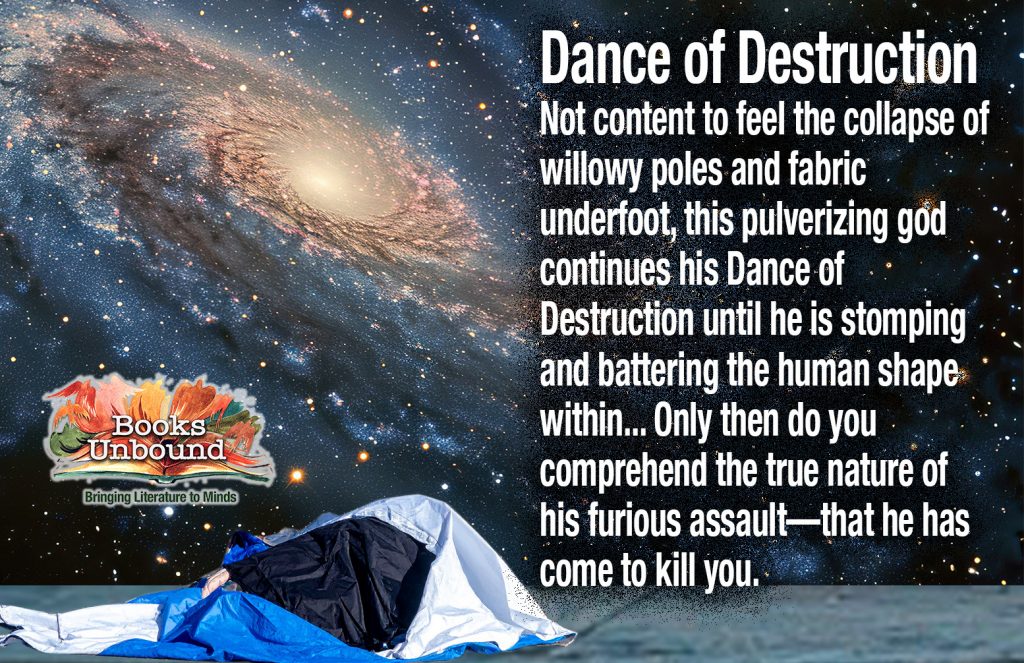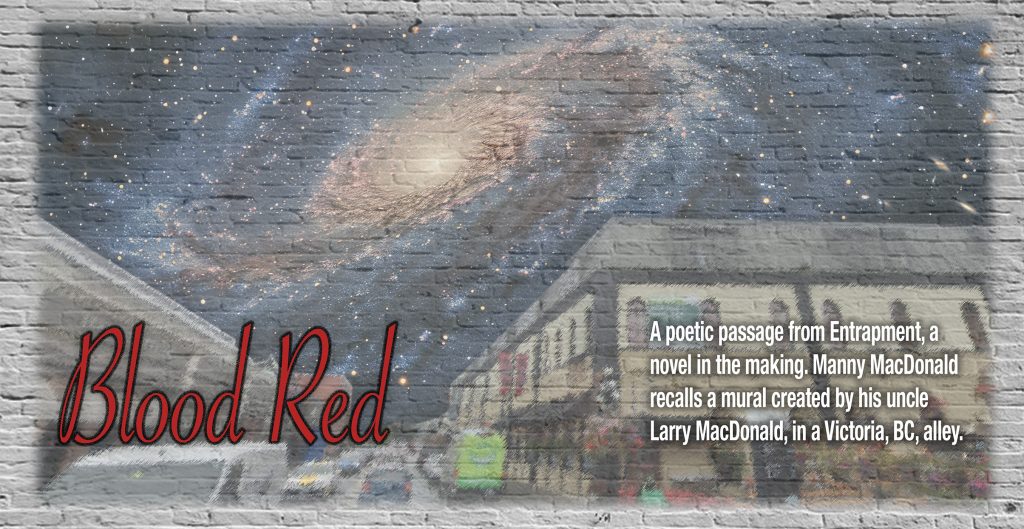
Homeless street artist Larry MacDonald is camped in the parking lot of the Inner Worlds Gallery in downtown Victoria. He has just completed a mural on the gallery’s external back wall, and has been commissioned to do another by gallery owner Brenda Tanner. The lot is enclosed behind a locked wrought iron gate. That’s not enough to make Larry feel secure though… nothing can make him safe from the threatening spectre of his abusive, tyrannical father, Carl MacDonald…
Imagine yourself a gentle spirit, camped—with permission—in a downtown parking lot. You don’t know what time it is because you don’t own a watch or a mobile to keep track of your days, hours, and minutes. You’re alone, a tiny node that exists in an infinite, eternal, omniscient, omnipotent network of connected conscious being.
Something has awakened you, and you’re instinctively alarmed, alert to every sound emerging out of the darkness. Might have been nothing, you think. But your body remains tensed, your breathing paused, heart thumping. Possibly an imagined sound? The fading clank of metal against metal conjured in a dream, a nightmare.
It’s gone. But you listen intently, trying to detect its echo merged into the background noise of urbanity: the hum of electricity through a faulty circuit; the distant throb of a motorcycle…
There! No mistaking it this time. It’s a sound you’ve heard before, one that matches a pattern most people would recognize, the sound of a chain rattling as it’s removed from a wrought iron gate and dropped to the ground.
Brenda? That doesn’t make sense. Why would she be here?
Another sound torques your anxiety, the unmistakable rattle of metal wheels on concrete, the gate opening. Not all the way. Just wide enough for a person to sneak through.
Should you unzip your tent door-flap and look to see who it is? Would you be able to identify them in the darkness? Should you shout, Who’s there? Let them know their trespass is not going unobserved.
No! Best to remain perfectly still, to pretend you don’t exist. Be invisible!
The scuffle of boots on gravel moves toward the far end of the Inner World Gallery’s back wall. Then there’s the sound of something being dropped to the ground, a backpack. Its owner rummages around, grunting, annoyed. You know who’s making the rooting, grunting sounds, but refuse to let that knowledge surface. It swims like a shark in its murky, unconscious depths; if you name the source of your terror, you will make it real.
Another sound sends tremors of panic and agony shooting through your nervous system. It’s the sound of a steel ball ricocheting against the inner wall of a shaken spray paint canister. Nooo! Your spirit shrivels like tissue paper thrown into a flame. Nooo! You want to block your ears. But you have to listen. It’s your day of judgment; refusing to give it voice by not listening would be a sin. You will be punished for that act of rebellion. It’s your duty to pay attention to the sputtered hiss of retribution. You will be chastised for denial.
Again and again, the canisters are shaken, the paint sprays. What colours is he spewing to obliterate my art? You ask the question as you infold, arms hugging knees, head tucked, eyes shut. ‘Whimpering like a whipped dog,’ as he would describe it.
Does it even matter which frequencies of light would be absorbed, which reflected in this vandal’s aerosol, his obliterating mist? It’s all black, and white, and shades of grey out there in his monochrome universe. His is the joyless satisfaction of a nihilist, of one who measures his stature by the piles of rubble and mounds of corpses he leaves behind.
I hate you! You want to shout. But you bottle and cork your rage because you know it’s pathetic. It would only fan the vitriolic fuel of his pleasure. He knows you’re helpless. You cannot stand up to him. Your petulance would only prove how successful he’s being with his torture.
Then the spraying stops. He turns, his boots rasping in the gravel, and faces your fabric shelter. He’s breathing heavily—not because he’s exhausted by his acts of desecration, but because he’s inflamed and needs more oxygen to sustain his obliterating passion. His boot smashes into the side of your tent with the force of a boulder dropped out of the sky. He’s stomping, kicking, trampling, an avenging demon come to destroy you. Not content to feel the collapse of willowy poles and fabric underfoot, this pulverizing Shiva continues his Dance of Destruction until he’s stomping and battering the human shape within its flattened shroud.
Only then do you comprehend the true nature of his furious assault—that he has come to kill you.
